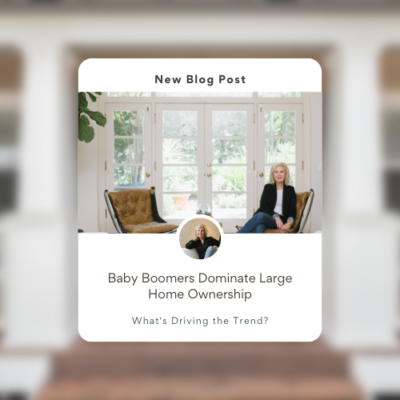 According to a new report, the generation whose kids have flown the nest now owns twice the number of large homes than the generation in the midst of raising families.
According to a new report, the generation whose kids have flown the nest now owns twice the number of large homes than the generation in the midst of raising families.
The report, published Tuesday by Redfin, found empty-nest baby boomers own 28.2 percent of the large homes in the United States — twice as many as millennials with kids, who own just 14.2 percent of them. Gen Z parents, meanwhile, own virtually no large homes, at just 0.3 percent.
While traditional logic suggests there should be a flood of large houses hitting the market over the coming years, with baby boomers no longer needing large houses now that their children have moved out, market conditions have disincentivized them from selling their homes and being forced into a housing market with low inventory and high costs.
“There’s unlikely to be a flood of large homes hitting the market anytime soon,” said Redfin Senior Economist Sheharyar Bokhari. “Logically, empty nesters are the most likely group to sell big homes and downsize: They no longer have children living at home and don’t need as much space. The problem for younger families who wish their parents’ generation would list their big homes: Boomers don’t have much motivation to sell, financially or otherwise. They typically have low housing costs, and the bulk of boomers are only in their 60s, still young enough that they can take care of themselves and their home without help.”
While baby boomers own an outsized share of the nation’s large homes — which the report defines as homes with three bedrooms or more — it should be noted that there are more millennials than boomers, with millennials making up roughly 28 percent of the United States population, followed by baby boomers at 27 percent.
Many young families are renting three-bedroom plus units across the United States, with millennials with children living in one-quarter of the large rental units in the country, the largest share of any generational category. They are followed by millennials without kids, who rent 11.6 percent of the nation’s large units.
Over the past decade, boomers have taken a larger share of the country’s large homes. In 2012, empty nesters from the silent generation (who were between 67 and 84 then) owned 16 percent of three-bedroom plus homes — a smaller share than their children in Generation X, who owned 19 percent of those large homes at the time, as they raised their families.
While buyers shouldn’t expect a massive crop of large homes on the market anytime soon, the report notes that some baby boomers will retire to smaller dwellings over time as the lock-in effect loosens with dropping mortgage rates.
“Some boomers are ready to downsize into a condo or move somewhere new for retirement, and the mortgage-rate lock-in effect is starting to ease — so even though there won’t be a flood of inventory, there will be a trickle,” Bokhari said.
For California’s older generation, here are some reasons to consider selling and buying smaller homes:
- Financial Gain: Selling a large home can free up substantial equity to invest or use for retirement.
- Lower Maintenance: Smaller homes often require less upkeep and maintenance.
- Reduced Costs: Smaller homes generally have lower property taxes, insurance, and utility bills.
- Accessibility: Downsizing to a single-story home or a condo can offer better accessibility as one ages.
For younger generations looking to save for a home:
- Create a Budget: Establish a clear budget to manage expenses and savings.
- Reduce Debt: Pay down high-interest debts to improve financial stability.
- Save Consistently: Set aside a portion of income regularly for a down payment.
- Explore Homebuyer Programs: Research government programs or first-time buyer incentives.
- Consider Shared Ownership: Cooperative housing or co-buying with family or friends can make homeownership more affordable.
The housing market landscape and generational differences should be considered when making real estate decisions in California and elsewhere. [1] [2] [3] [4] [5] [6]

